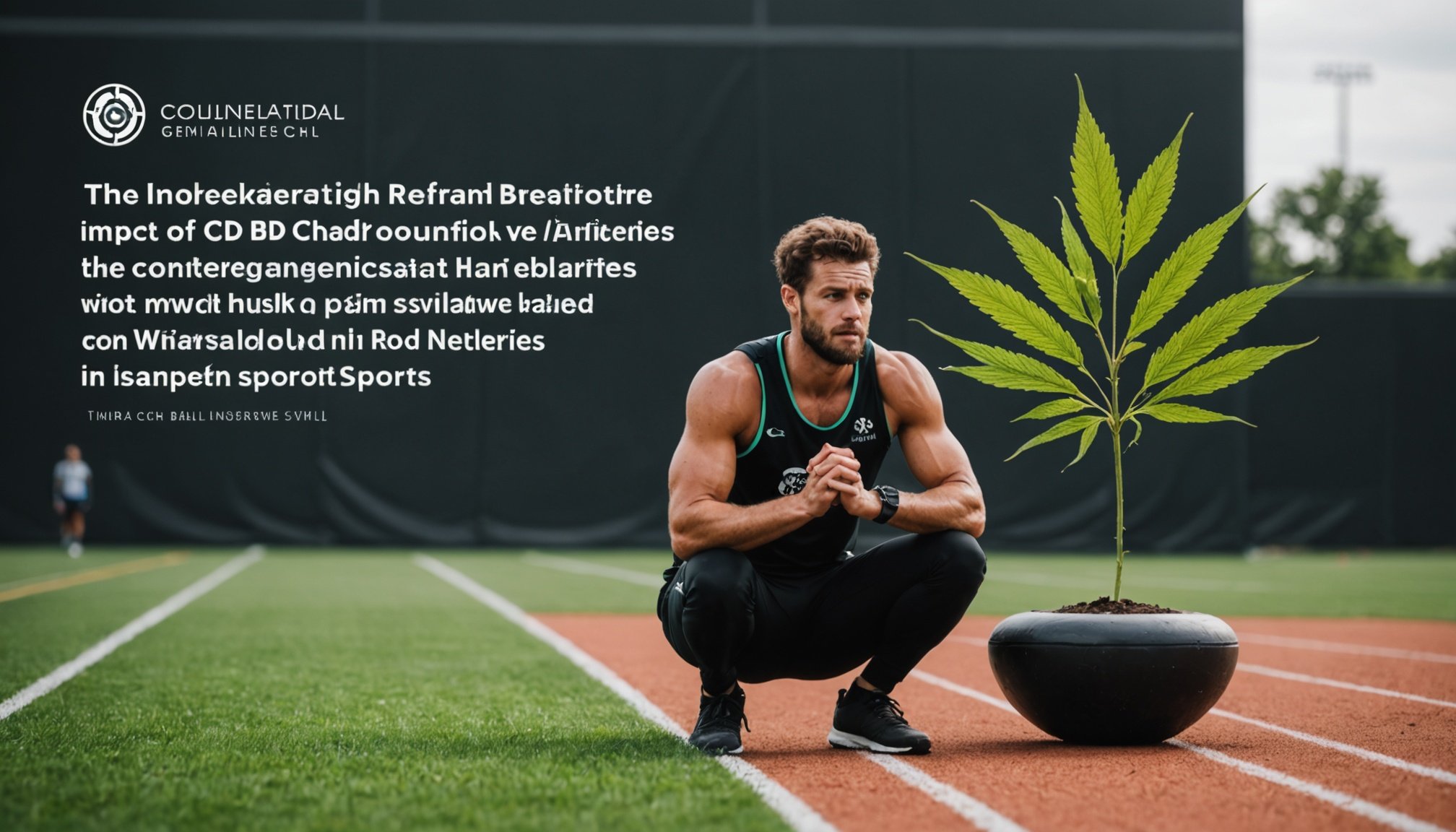Unveiling Groundbreaking Research: The Impact of CBD on Pain Management for Athletes in Contact Sports
The Evolving Landscape of Sports and Cannabis
In recent years, the intersection of sports and cannabis has undergone a significant transformation. What was once a taboo topic is now a subject of intense research and advocacy, particularly when it comes to pain management for athletes in contact sports. Athletes like Ricky Williams, Al Harrington, and Eugene Monroe have been at the forefront of this movement, sharing their personal experiences and advocating for the use of cannabis, especially CBD, as a legitimate tool for recovery and wellness[1].
Understanding CBD and Its Potential Benefits
CBD, or cannabidiol, is a non-psychoactive compound derived from the cannabis plant. Unlike THC, it does not produce a high but has been shown to have numerous health benefits, including anti-inflammatory effects, improved sleep quality, and pain relief. Here are some key potential benefits of CBD for athletes:
This might interest you : Transform your running experience: how high-tech insole sensors enhance technique and reduce injury risks
- Pain Relief: CBD has been shown to reduce chronic pain by interacting with the body’s endocannabinoid system. Studies have indicated that CBD can significantly reduce pain in athletes, improving their quality of life[3][5].
- Anti-Inflammatory Effects: CBD’s anti-inflammatory properties can help reduce swelling and inflammation, common issues in contact sports. This can aid in faster recovery times and reduced risk of long-term damage.
- Improved Sleep: Athletes often struggle with sleep due to physical stress and mental pressure. CBD has been found to improve sleep quality, which is crucial for recovery and overall health[2].
- Mental Health: CBD may also have a positive impact on mental health by reducing anxiety and stress, which are common among athletes.
Real-World Examples: Athletes’ Experiences with CBD
Athletes who have transitioned from traditional painkillers to CBD products often report significant improvements in their health and well-being. Here are a few compelling examples:
Ricky Williams
Ricky Williams, the 1998 Heisman Trophy winner and former NFL star, has been a vocal advocate for the use of cannabis in sports. After years of battling injuries and the pressures of professional sports, Williams discovered cannabis as a powerful tool for pain relief and self-discovery. He now runs his own cannabis brand, Highsman, which aims to provide high-quality cannabis products for athletes and non-athletes alike[1].
Al Harrington
Al Harrington, a retired NBA All-Star, had a career marred by injuries, including a botched knee surgery that led to a Staph infection. Harrington turned to cannabis as a last resort and found it to be a game-changer. He now runs Viola Brands, a cannabis company named after his grandmother, and is a strong advocate for the medicinal use of cannabis in sports. Harrington emphasizes the importance of quality and social equity in the cannabis industry, ensuring that his products are good enough for his grandmother and that minority-owned businesses have opportunities to thrive[1].
Scientific Research: The Evidence Behind CBD’s Effects
Several studies have delved into the effects of CBD on athletic performance and pain management. Here are some key findings:
Pain Management
A study published on ResearchGate found that CBD significantly reduced pain and improved the quality of life for participants. The study used self-reported measures to assess the effects of CBD on pain and found promising results, with most participants reporting significant reductions in pain[3].
Anti-Inflammatory and Neuroprotective Effects
Another study highlighted the anti-inflammatory and neuroprotective effects of CBD. This is particularly relevant for athletes in contact sports who are at risk of mild traumatic brain injuries. CBD’s potential to reduce inflammation and protect the brain makes it an attractive option for athletes looking for alternative pain management solutions[2].
Clinical Trials
The NFL has partnered with Canadian researchers on a clinical trial to explore the safety and efficacy of CBD for pain management and neuroprotection. This trial is a significant step forward in understanding the potential benefits of CBD for athletes and could lead to policy changes in various sports leagues[4].
Comparative Analysis: CBD vs. Traditional Painkillers
Here is a comparative analysis of CBD and traditional painkillers, highlighting their differences and potential benefits:
| Aspect | CBD | Traditional Painkillers |
|---|---|---|
| Pain Relief | Effective for chronic pain, with fewer side effects | Effective but often associated with addiction, liver damage, and other side effects |
| Anti-Inflammatory | Has anti-inflammatory properties | Some have anti-inflammatory effects but can also cause stomach ulcers and other issues |
| Addiction Risk | Low risk of addiction | High risk of addiction, especially with opioids |
| Long-Term Use | Generally safe for long-term use | Can have severe long-term side effects, such as liver damage and kidney problems |
| Mental Health | May reduce anxiety and stress | Can exacerbate mental health issues in some cases |
| Legal Status | Varies by jurisdiction; often legal in hemp-derived form | Legal but heavily regulated and monitored |
Practical Insights and Actionable Advice
For athletes considering the use of CBD for pain management, here are some practical insights and actionable advice:
- Consult a Medical Professional: Before starting any new regimen, it is crucial to consult with a medical professional to ensure that CBD is safe and appropriate for your specific needs.
- Choose High-Quality Products: Look for CBD products that are hemp-derived and have been tested for purity and potency. Brands like Viola Brands and Highsman emphasize the importance of quality and transparency.
- Start with Low Doses: Begin with low doses and gradually increase as needed. This can help you understand how your body reacts to CBD.
- Combine with Other Recovery Methods: CBD can be part of a comprehensive recovery plan that includes rest, physical therapy, and other wellness practices.
The Future of CBD in Sports: Policy Changes and Advocacy
The world of sports is slowly but surely embracing CBD as a legitimate tool for recovery and wellness. Here are some recent policy changes and advocacy efforts that highlight this shift:
NBA Policy Change
The NBA has made significant strides by allowing players access to CBD products. This policy change, advocated for by Al Harrington and others, marks a monumental step forward in recognizing the potential benefits of CBD for athletes[1].
NFL Clinical Trials
The NFL’s partnership with Canadian researchers on CBD clinical trials is a promising development. These trials could lead to more widespread acceptance and integration of CBD into sports leagues’ policies[4].: Embracing the Future of Sports and Cannabis
As the world of sports continues to evolve, it is clear that CBD is here to stay. With its potential benefits for pain management, anti-inflammatory effects, and mental health, CBD is becoming an essential tool for athletes in contact sports. Through education, advocacy, and innovation, athletes and entrepreneurs are paving the way for a new era where wellness and recovery seamlessly intertwine with cannabis.
Whether you are an athlete looking for alternative pain management solutions or simply interested in the intersection of sports and cannabis, it is time to listen, learn, and explore the realm of Sports Cannabis. The game has indeed changed, and it’s just beginning.











